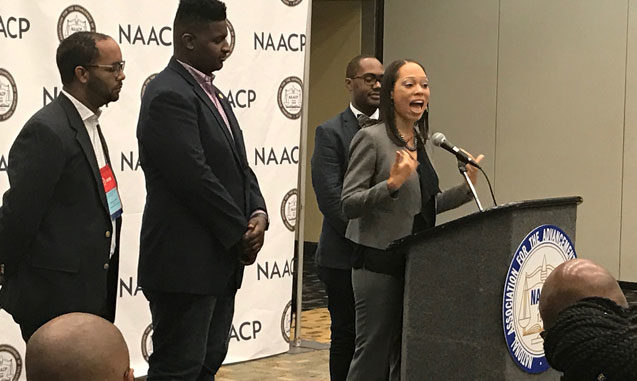
Lauren Poteat
As Derrick Johnson assumes the role of interim president of the National Association for the Advancement of Colored People (NAACP), leaders of the nation’s oldest Black civil rights organization say that young people must come first.
Youth-led civil rights groups like Color of Change, Black Youth Project 100 and Dream Defenders have effectively used technology and social media to advance their causes online and around the world, while critics of the NAACP question the group’s relevancy, as it struggles to connect to a younger generation that doesn’t always relate to the battles of Civil Rights Movement of the 1960s.
During a press conference held on July 21, kicking off the group’s national convention in Baltimore, Md., many NAACP officials and affiliates gathered to address a critical need to keep millennials active and engaged within the organization.
“We have a responsibility to lift up the least of us, but most importantly to put our hands on the young people,” said Baltimore’s Mayor Catherine Pugh. “We can change the trajectory of our lives. Let’s have some real conversations around guns in the community killing our children, because we need [our children] to grow up and be a part of the future of our nation.”
In order to ensure that such goals come into fruition, NAACP D.C. branch President Akosua Ali, formally announced the launch of a national Next Generation Young Professional Leadership Program to train eligible millennials for leadership roles in the NAACP.
The initiative is in line with the NAACP’s National Youth and College Division that cultivates young, civil rights leaders. Messages promoting the division were prominently displayed during the convention.
“This national convention will be critical in transforming the association,” Ali said. “The Youth and College Division continues to train and cultivate young leaders that are activists within their own community and, because of that, the NAACP will launch a Next Generation Young Professional Leadership Program geared toward training young adults between the ages of 21 and 35,” for positions in the NAACP.
Ali continued: “These positions include, but are not limited to: political action chairs, health chairs, environmental justice chairs and branch leaders. We have been very fortunate to have the support of national and youth board members, who have all given input into what is needed for young people to remain active to remain engaged and to be strong leaders within this organization and we are immensely excited about the future of the NAACP through this program.”
Eager to see the organization grow and move forward, Hiruy Hadgu, an NAACP member from Howard County, Md., shared his views on the organization’s plan to ramp up efforts to actively engage and recruit younger members.
“I joined the NAACP after the 2016 election and was responsible for helping my chapter revamp membership efforts, which proved difficult, as we had a hard time keeping up with who was a member or not…a lot of the processes seemed old and outdated and overall didn’t really seem to engage people,” said Hadgu. “I’m only 31, but with these challenging times, I think it’s very important to really re-engage with the community…especially our youth.”
Recommended For You.



Be the first to comment